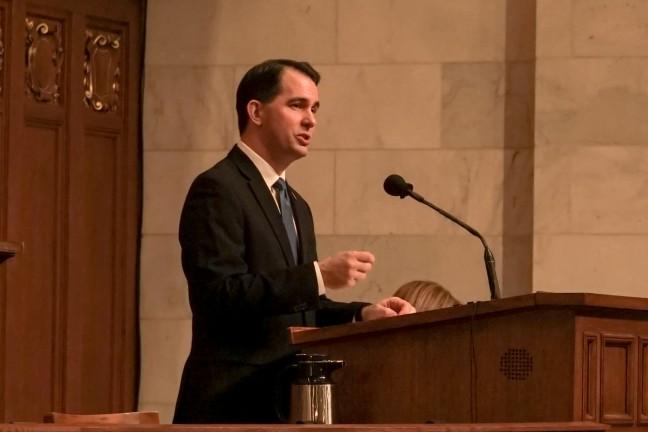Gov. Scott Walker’s actions have been controversial for a long time, but they’re starting to blur into legally questionable territory.
In Dec. 2017, Rep. Keith Ripp, R-Lodi, and Sen. Frank Lasee, R-De Pere, resigned from their seats to take positions within Walker’s administration. This is a perfectly passable arrangement, as long as Walker holds special elections to fill the two newly vacant seats. Unfortunately, Walker is refusing to hold elections for either seat.
The immediately reasonable question one may ask is, “why would our governor refuse to hold special elections for vacant legislative positions?”
At first glance, the Walker administration’s reasoning sounds justifiable. Amy Hasenberg, the governor’s spokesperson, recently stated that holding special elections for Wisconsin would be a waste of taxpayer money. This sounds like a fair concern, considering any elected official likely wouldn’t take office until after the end of Wisconsin’s 2018 floor period and both seats would be up for reelection in Nov. 2018.
But this lack of district representation poses a serious problem if Walker were to call for any special legislative sessions before November and he’s been explicit in stating this exact intention.
Too soon to tell how Wisconsin’s special election upset will impact midterm election
It’s important to ask ourselves what exactly this means — the implications are a bit abstract. In the Wisconsin Senate, Democrats currently holds 14 seats compared to Republicans’ 18 . The state Assembly has an even greater disparity, with 35 Democrats compared to 63 Republicans. Clearly, Democrats aren’t going to be winning any major legislative battles with those numbers, even if they were to gain an additional seat in each branch.
Luckily, our government operates under the idea that legislation is not just about winning and losing, but instead about drafting policy through compromise and discussion.
Wisconsin’s 1st District has over 27,000 constituents. If no special election is held, all of these citizens will lack representation for any legislation voted on leading up to the 2018 election. This is worrisome since open, honest debate and discussion is inarguably the most beneficial route to good government policy.
Hasenberg argued on Walker’s behalf that the decision to delay any special elections until November was based purely on saving money. I don’t buy that.
Wisconsin has already held one special election in 2018 and I think that gives some insight into why the Walker administration refuses to host any more elections. In early 2018, Sen. Patty Schachtner, D-Somerset, scored an unexpected victory and was the first Democrat to win the seat in over 15 years. Furthermore, Wisconsin’s 10th District voted in favor of President Donald Trump in the Nov. 2016 election by a margin of around 11 percent.
This demonstrates a large swing in the partisanship of the electorate that you can’t blame Republicans for being afraid of, especially considering that both vacant seats had similar margins of victory in the 2016 election.
To argue that the reason for obstructing special elections is to save money is nothing short of disingenuous, especially after already holding a special election earlier in the year.
Fortunately, Walker’s decision to postpone elections until late 2018 is not going unnoticed. Former Attorney General Eric Holder has filed suit against the Walker administration for policies unrepresentative of the public. This case is in its early stages and will take some time to pan out.
But it’s undeniably a step in the right direction for combatting Walker’s unfair decision to silence the voices of Wisconsin’s 1st and 42nd Districts.
Brett Mower ([email protected]) is a senior majoring in journalism and economics.




















